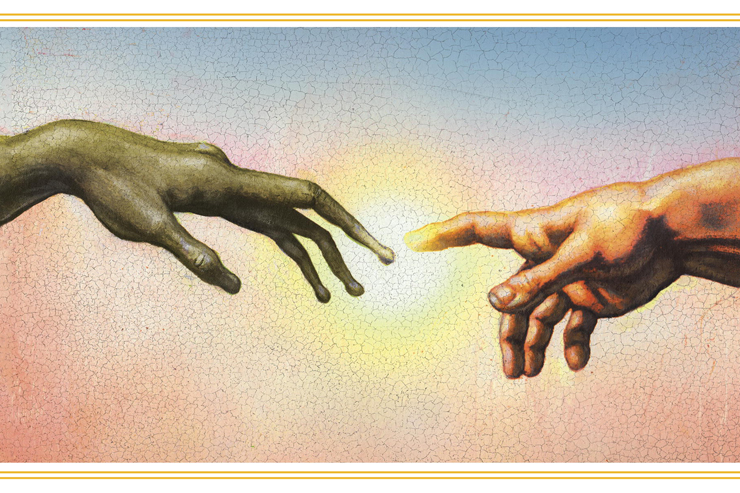 I’m a firm believer in seeking out opportunities to observe humanity outside one’s normal daily routine, and whether that means attending a black tie event, the country fair, or a medieval festival, I’m generally game. Last fall I attended my second rodeo, although I have to admit I went partly just so I could tell people, “This ain’t my first rodeo.” A few hours into the evening, the announcer introduced us to the halftime show of sorts. Right before my eyes, out into the middle of the arena came monkeys riding dogs.
I’m a firm believer in seeking out opportunities to observe humanity outside one’s normal daily routine, and whether that means attending a black tie event, the country fair, or a medieval festival, I’m generally game. Last fall I attended my second rodeo, although I have to admit I went partly just so I could tell people, “This ain’t my first rodeo.” A few hours into the evening, the announcer introduced us to the halftime show of sorts. Right before my eyes, out into the middle of the arena came monkeys riding dogs.
I watched in disbelief as the dog-riding monkeys began to herd sheep. I listened to their owner tell us that he always dreamed of owning a monkey, and now his dreams had come true.
I squinted, trying to make sure the monkeys were real and not stuffed animals. They were real, all right. And they were wearing sequined vests.
I looked at the people around me, wondering why no one was freaking out. We were watching sequined vest-wearing monkeys riding dogs herding sheep!
And no one was reacting.
What?!
People went on their way, buying concessions, talking to their neighbor, politely applauding the monkeys. Yet no one seemed to think this was out of the ordinary.
Sequined vest-wearing monkeys riding dogs herding sheep. Apparently these people were desensitized to such things.
Reflecting on it later, I realized that my experience had similarities to preaching the Gospel message. When Paul first preached the Christian message to the pagans of the Roman Empire, it was like nothing they had heard before. We can tell by their response. For example, when he told them about the resurrection, his listeners in Athens mocked him (Acts 17:32).
And yet we hear about the resurrection and we don’t even blink. We hear homilies about God becoming man and bread becoming God and loving our neighbor as ourselves and three Persons in one God and we barely even react. We have become desensitized to the truth.
We have become desensitized to things like, “God is love” and “God loves you.” I certainly learned that in my catechesis growing up, but did I ever stop to marvel at what that meant? The eternal, omnipotent God loves me. There is a radically transcendent God, who needs nothing and who himself is outside of creation, who chooses to create something other and then chooses to love that creation. He chooses to love it to such an extent that He not only creates it and sustains it, but he becomes man and dies for it.
Why doesn’t this shock me every time I hear it?
I was listening to a talk once about the birth of Christ where the scholar was doubting the Magi and the star of Bethlehem. I wished later I had the audacity to challenge her. You’re doubting that a star can appear in the sky to astrologers in the east, who then travel to find a baby…but you’re okay with that baby being God? Which is the greater miracle? Which takes more faith?
My prayer today is that I continue to marvel at the truth of God’s goodness. Christianity is full of crazier things than sequined vest-wearing monkeys riding dogs herding sheep- things like God suffering, bodies rising from the dead, and the forgiveness of sins. Maybe these would be hard for Athenians to grasp, but I have been given the supernatural grace of faith to hear it and accept it with hope.
And may we begin to preach it like it matters! One of the side effects of becoming desensitized to the truth is proclaiming it with boredom, if one proclaims it at all. How many people are excited on Sunday morning when they hear from the pulpit that God became man and died for their sins? The people in the pew have become desensitized, and it’s partly because the preacher has become desensitized.
The few times people seem to get riled up is when we teach something in the Christian message that is counter-cultural. God becoming man? Eh, I can accept that. But not cohabitating before marriage?
Now they’re looking at me like I’m talking about sequined vest-wearing monkeys riding dogs herding sheep.
Some days, working for the Church in our deChristianized culture, I do feel like I’m talking about sequined vest-wearing monkeys riding dogs herding sheep. Things like the definition of marriage, the reality of human sexuality, the preferential option for the poor, or even the difference between man and animals are rejected or dismissed, and when you have the audacity to teach them, people act like you’re preaching craziness.
Perhaps we are okay with crazy truth that doesn’t seem to directly affect our daily life. “God became man? Sure.” But once it affects us personally, then we throw up our hands at hard sayings. “You want me to do what!?” The problem is, God becoming man does directly affect our daily life. Or at least it should. And once we actually accept that truth for what it is, then we have to make room in our lives for the hard sayings.
The only time I’ve seen someone walk out of Mass during a homily is when Father dared to preach on the definition of marriage. Father’s tone was not harsh, but loving. He was not condemning, but calmly and rationally presenting the truth. But the truth is hard to accept. It requires grace and faith and an openness to the possibility that I might have to change the way I think or act.
We have the same decision to make as the Athenians did when they heard the crazy message of Paul in Acts 17. Will we mock the truth because it seems hard to believe? Will we simply shrug and push it away for another time? Or will we embrace it with the grace of faith?














